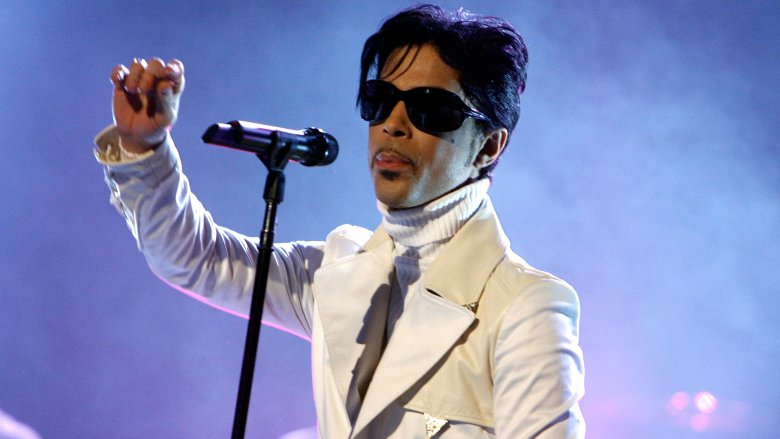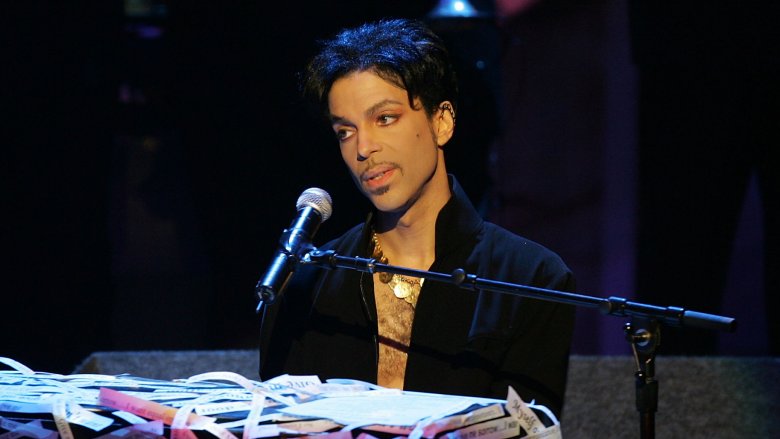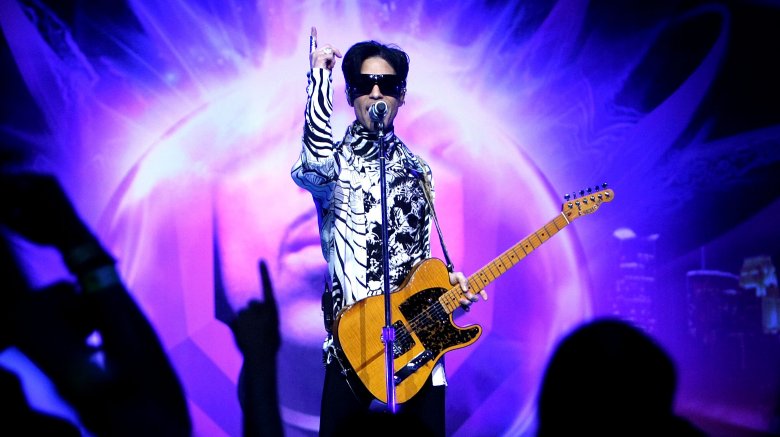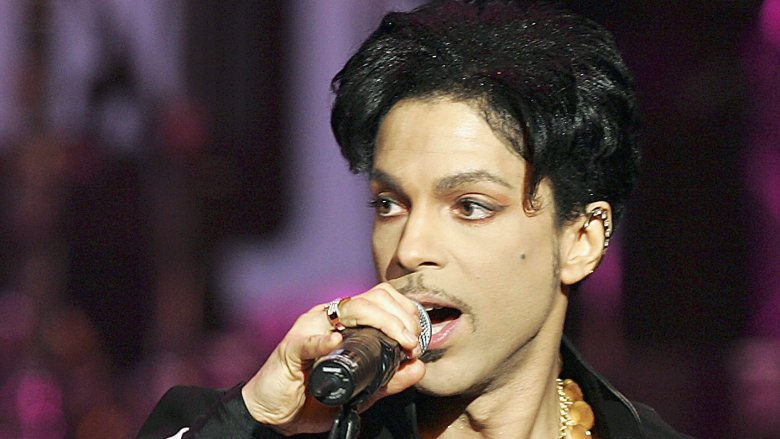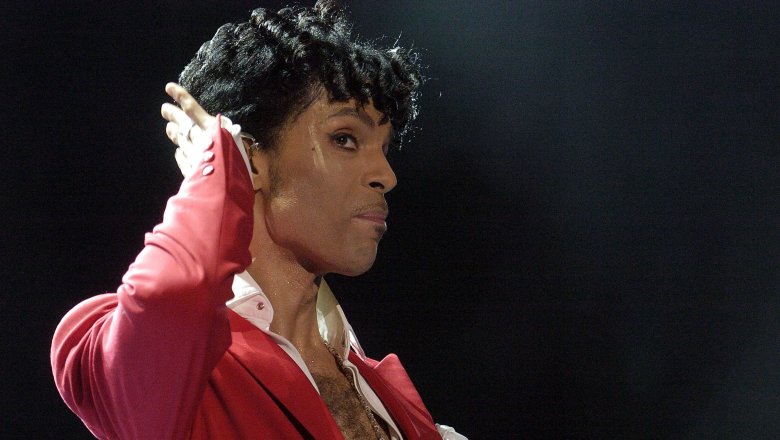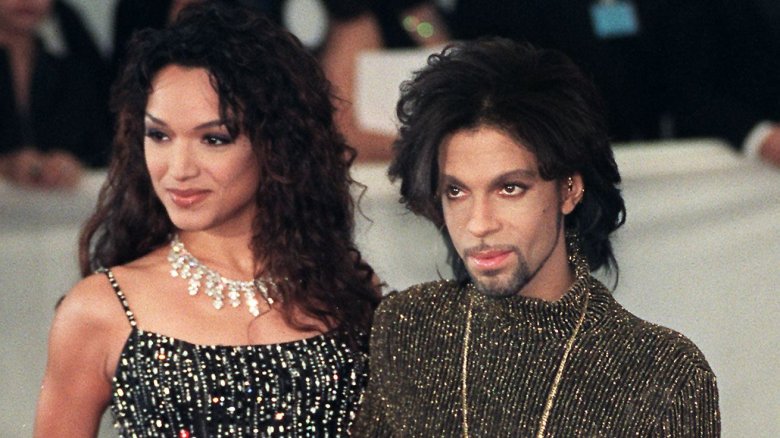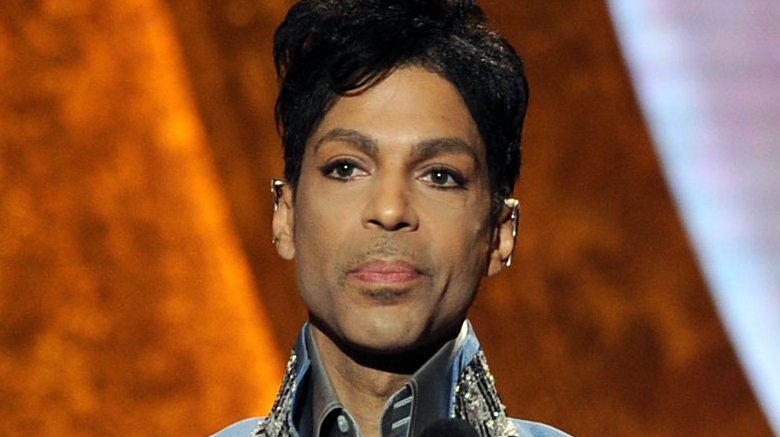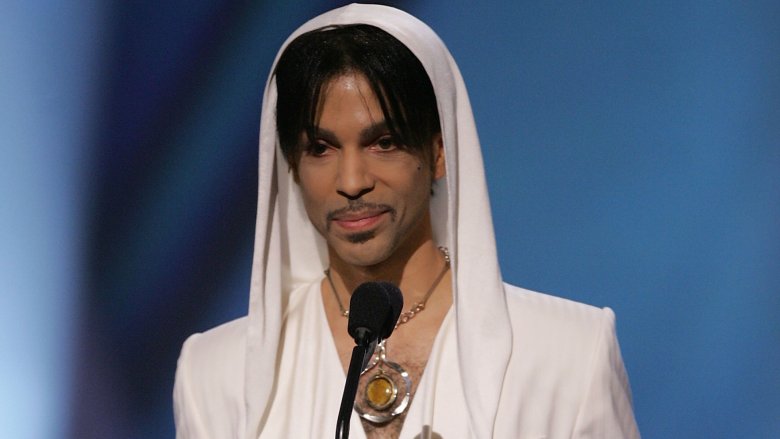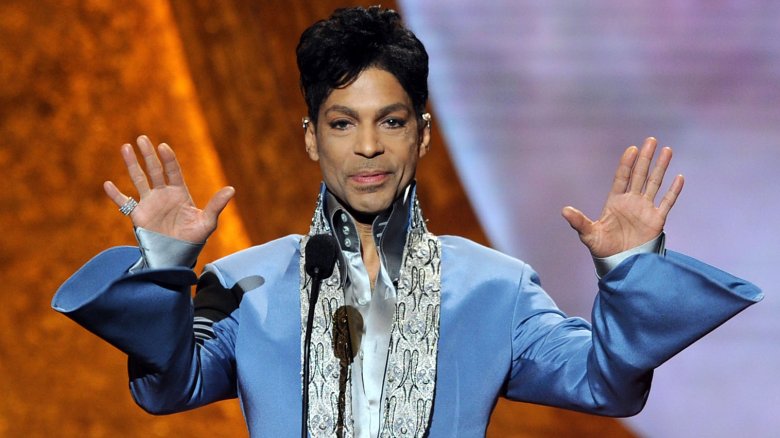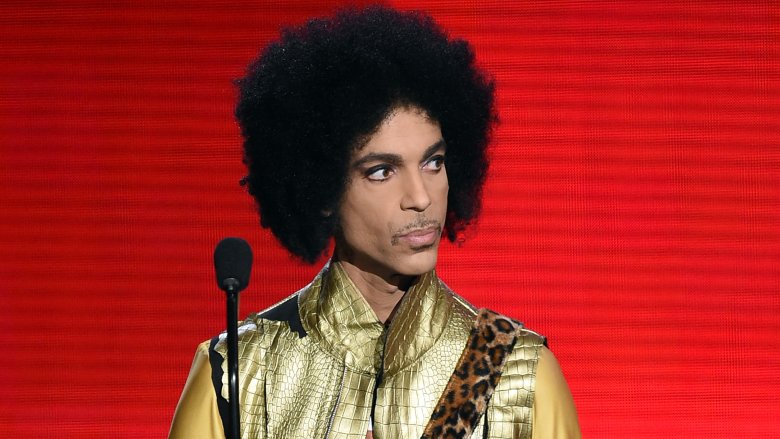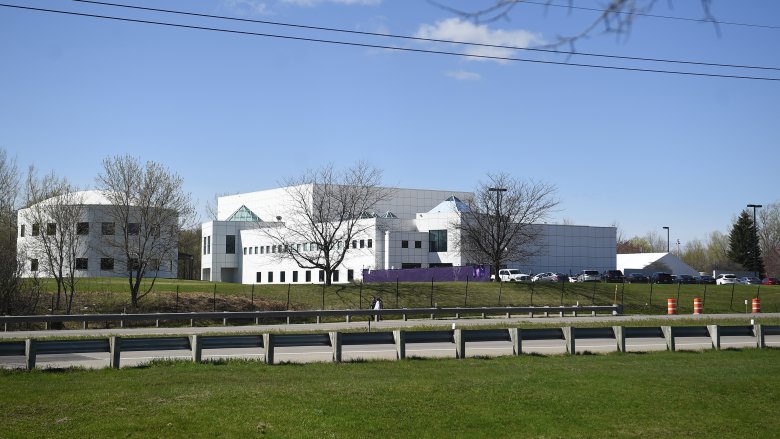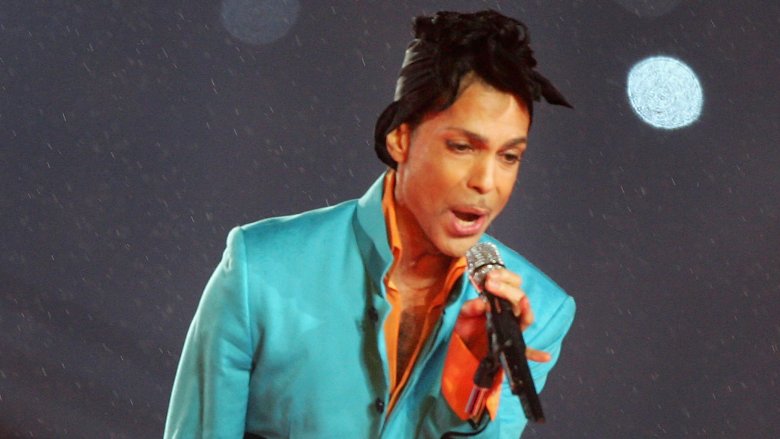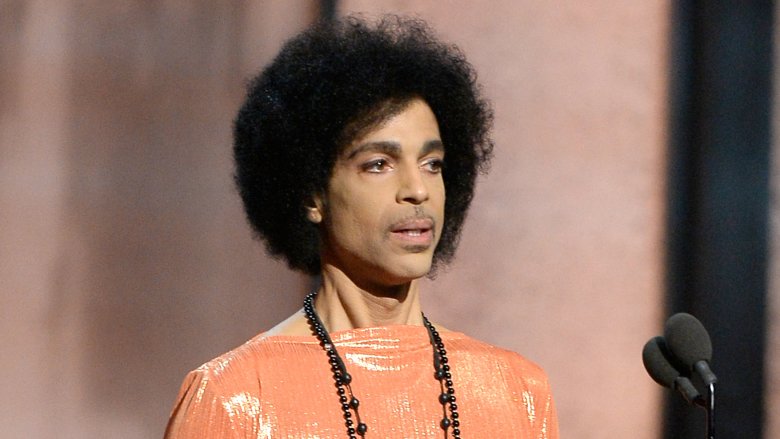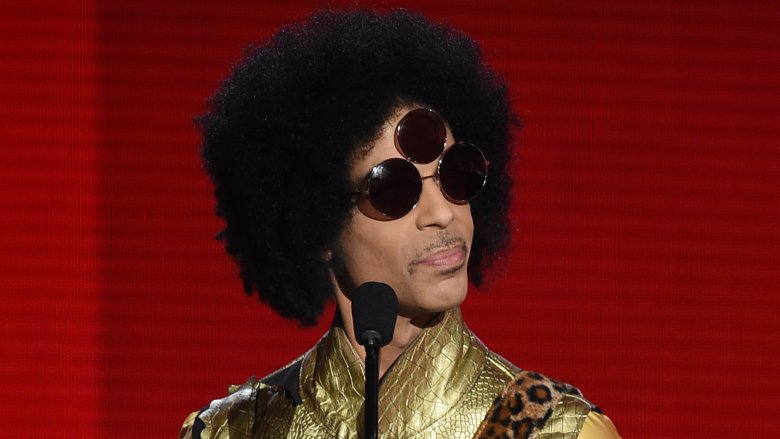Shocking Facts We Learned About Prince After His Death
The world was shocked to learn that Prince, the artist behind massive hits "When Doves Cry," "1999" and others, died on April 21, 2016. Since his sudden passing, which was caused by an opioid overdose, friends, family and reporters have come out of the woodwork to unearth and share odd facts and stories about the late star. While much of what people have learned about him was positive, not all of it was good news, particularly regarding the circumstances of his death.
Of course, there are many more fascinating things about Prince aside from how he mysteriously left this world. The music star was an intensely private person, and he kept all kinds of secrets about his personal life, including about his religion, which he preferred not to discuss with people. We dig into all of that and more with the shocking facts we learned after Prince's death.
A deadly secret
After a year of rampant speculation about Prince's death, search warrants and other official documents were unsealed. According to CNN, what was found at the "Kiss" singer's house was troubling to say the least, and painted a far darker portrait of the music legend than he'd led on for years as a devout Jehovah's Witness (more on that in a minute). As far as details go, none of the pills found in Prince's Paisley Park estate were prescribed to him — none. CNN also revealed that bottles of opioid painkillers were stashed throughout the house — some were hidden in vitamin pill containers, envelopes and other places.
To make matters worse, some of the drugs were prescribed to Prince's drummer, Kirk Johnson. Johnson's physician, Dr. Michael Todd Schulenberg, says he wrote an Oxycodone prescription for the "Purple Rain" singer under the drummer's name for the sake of anonymity. But as the official Minnesota Prescription Monitoring Program revealed, Dr. Schulenberg only wrote one prescription, leaving everyone to wonder: where did the wealth of pills come from?
Unfortunately, the answer to that — after a two-year exhaustive investigation by Carver County officials — is that no one knows.
The fatal dose
After Carver County completed the investigation into Prince's death, they announced there would be no criminal charges as a result. Not even for Dr. Schulenburg, who admitted to wrongdoing when he prescribed pills for Prince under a friend's name. Schulenburg ended up cutting a deal with the U.S. District Attorney's office to pay "a $30,000 fine and be monitored over two years by the Drug Enforcement Administration," according to the Star Tribune. He was also 100% cleared of responsibility in Prince's death.
"There is no reliable evidence showing how Prince obtained the counterfeit Vicodin containing fentanyl," Carver County Attorney Mark Metz said during a press conference addressing the findings of the investigation. In fact, the fentanyl that killed the "Purple Rain" singer is another source of controversy, since according to the huge batch of records unsealed after the investigation, it was determined that not only was Prince unaware that he was taking the powerful opioid, he was on a dose "22 times what would be found in a cancer patient who regularly wore a pharmaceutical fentanyl patch."
This revelation was shocking to Prince's army of loyal fans around the world, but perhaps not so much to his inner circle, who in the last weeks of the singer's life, tried desperately to help him.
The secret battle to save Prince's life
According to interviews unsealed in the April 2018 document dump, Prince's longtime friend and confidante Kirk Johnson revealed that in the last weeks of the rocker's life, it became apparent to those closest to him that he'd been hiding a serious addiction. Johnson said that after noticing changes in Prince's "behavior" and "mood," he suspected something was up. "That's why I took the initiative and said let's go to my doctor because you haven't been to the doctor, let's check it all out," Johnson told investigators.
That's when Prince visited Dr. Schulenburg, who wrote Prince a prescription for Percocet in Johnson's name a week later. The same day Schulenburg wrote the script, Prince's flight back to Minnesota from Atlanta had to make an emergency landing in Illinois when he'd become unresponsive. Prince was revived with "two doses of a drug that reverses effects of an opioid overdose," according to The Chicago Tribune, and he was later vague with health officials about what kind drugs he had taken. He'd also "refused routine overdose testing."
Six days later and seeking treatment for flu symptoms, Prince was back in Schulenburg's clinic, where a urinalysis of the singer later tested "positive for opioids." This triggered Prince "staffers" to contact Dr. Howard Kornfeld, an addiction specialist from California, who immediately flew his son, Andrew, to Prince's Paisley Park home in Minnesota with the intention of treating him for opioid addiction.
Unfortunately, it was too late, and by the time Andrew Kornfeld arrived the next day, he would end up being part of the group who discovered Prince's dead body.
Did investigators drop the ball?
It wouldn't be fair to call Prince a technophobe, although he did famously choose not to use a cell phone, opting instead to communicate via landlines and email. That's why it was all the more shocking to find out that investigators failed to search his laptop in a timely manner, according to KSTP.
A Carver County Sheriff's deputy said he had the opportunity to recover the laptop from beside the late singer's bed during the initial sweep of his house. "I regretted not taking the computer by the bedside of Nelson as I believed that this contained conversations between his staff and Nelson about medications possibly," the deputy later said. It would take another five days and with the execution of a warrant to retrieve the laptop, which had by then been moved into a locked room.
But according to the complaints of Prince's family members — which were also documented in the aforementioned April 2018 record unsealing (via KSTP) — Prince's staffers had access to the laptop and could have tampered with it in order to protect the notoriously private singer. In fact, KSTP also reported that "a search warrant for one of Prince's e-mail accounts revealed that 'content had been deleted.'"
Granted, it's all speculation now, but the laptop could possibly have provided clues as to where Prince got the fentanyl that cost him his life. Unfortunately, with Carver County now declaring the case "inactive," it's unlikely this avenue will ever be fully explored.
His sleeping habits sound like a nightmare
Prince kept an unusual schedule it seems. He would sometimes go long periods of time without getting proper rest or eating complete meals – sometimes all for the sake of music. His ex-girlfriend Charlene Friend spilled the details to People saying, "He would sometimes stay up for five days at a time without sleep, food or even water, going nonstop back and forth to the studio. I had to sneak in catnaps to keep from passing out from exhaustion. The first time that happened, I asked him, 'How do you do this?” Prince supposedly told her he manages with the help of "Angel food. Food of the spirit, not of the flesh."
She would later learn that "food" was more powerful than she could handle. Friend adds that when Prince did finally get rest, he covered the windows with aluminum foil, turned the heat up to 80 degrees and slept. "He would be shaking all through the night," she said. "The first time that happened, I asked him if he was having a nightmare and he said, 'No. I was dreaming music.' Even in his sleep, the music just poured out of him."
She later learned from Prince's half-brother, Duane Nelson, that Prince was able to do such odd things because of drugs. "'We call it the cocaine diet,'" Nelson told Friend. "It was shocking to me to hear that. He hid it so carefully," she said. "I never saw him take even an aspirin. He seemed so health-conscious, always taking vitamins like echinacea and goldenseal."
He never got over his son's death
In 1996, Prince and his then wife Mayte Garcia were thrilled to learn they were expecting their first child. But things slowly turned from happiness to concern when Garcia one day began to bleed, according to a People excerpt of her book The Most Beautiful: My Life with Prince. A doctor recommended an amniocentesis test, which checks for genetic abnormalities. Prince was against the idea and decided to pray for his baby's health. But the doctor insisted there could be something seriously wrong saying, "Sometimes the body is trying to release the fetus for a reason."
When their baby, a boy, was born on October 16 of that year, their joy quickly disappeared as they learned the child suffered from Pfeiffer syndrome type 2. "[It's] a genetic disorder that causes skeletal and systematic abnormalities," she writes in her book. "The premature fusing of the bones in the skull, sometimes resulting in 'cloverleaf skull,' in which the eyes are outside the sockets..." They named him Amir, which is Arabic for prince.
"They brought the baby over to us," she recalled. "He was curled on his side, gasping shallow little gulps of air. Because there were no lids to blink, his eyes look startled and dry. I caught hold of his tiny hand, saying over and over, 'Mama loves you. Mama's here." Doctors then worked to rescue little Amir's life, but he died six days later.
"I don't think he ever got over it," Garcia said. "I don't know how anybody can get over it. I know I haven't."
He loved to give, but wanted no credit
While most of the shocking stories about Prince after his death are certainly dark, there are a few positive things that have come to light. For one, he was very charitable — always giving and always helping others in need. Like most stars who give with their wallets, Prince seemingly didn't want to bring attention to his good deeds.
According to a Fader roundup of Prince's charitable givings, he once helped out troubled singer Lauryn Hill. "I was on a plane that landed, and my phone rings. It's Prince," recalls media pundit and Prince's friend Van Jones. "He goes 'Where are her kids? Where are her kids?' I go 'Prince, what are you talking about?' He goes 'Lauryn Hill, where are her kids?' He had found out that Lauryn had gotten into some trouble and his first thing he wanted to know was where were her kids, and what could we do to help." Jones followed up that Prince wanted to keep much of his helping a secret. "[Prince] did not want it to be known publicly, but I'm going to say it because the world needs to know that it wasn't just the music," Jones recalled. "The music was one way he tried to help the world. But he was helping every day of his life."
Prince also paid a whopping $80,000 toward the medical bills of famed drummer Clyde Stubblefield, according to Billboard. To make the donation all the more unique, Stubblefield is one of Prince's idols and the two have never met before. As the story goes, Stubblefield was battling bladder cancer and was some $90,000 in debt with medical bills. Prince's people got a hold of Stubblefield's wife and made the donation under the condition it would remain a secret. "He was very different. To help people, number one, that makes you different right there," Stubblefield told Madison Wisconsin's New 3 after Prince's death.
Brother Nelson
While the world certainly knew that in 2001 Prince converted to Jehovah Witness — a conservative religion that expected it's followers "to avoid recreational drug use" — few people knew his religion was deeply important to him. In fact, around the Kingdom Hall of St. Louis Park, Prince, whose real name was Prince Rogers Nelson, was only known as Brother Nelson, reports the Los Angeles Times. Perhaps one of the world's most known sex symbols, with raunchy lyrics and dance moves, was a conservative man in a shirt and tie when it came time to worship.
"He was accepted as our brother," one fellow congregant told the paper. "He wasn't treated as maybe the world would treat him." Despite his mega star power, he even knocked on doors to spread the word of his religion – often to the surprise of others. And he took it seriously, leaving pamphlets and once explaining why Jehovah Witness was the way to go to a Jewish couple.
The congregation was also understanding of his occasional absence for long periods of time due to his musical commitments. It's also said that he visited other Kingdom Halls while touring the country. But his St. Louis Park Kingdom Hall was his home-base. "He felt like it was a safe place here," said one fellow worshiper.
He's going to put Tupac's posthumous work ethic to shame
After Prince's death, his Paisley Park estate was scrubbed in search of a will and other clues that may point to his private life. But a vault containing thousands of songs was also uncovered. According to The Independent, the company that was handling his estate at the time of his death, Bremer Trust, had to break into this massive vault where tons of unreleased songs were kept.
Prince, who alluded to the massive keeping on The View in 2012, was the only person who knew the code and thus breaking into it was the only reasonable method. His former recording engineer Susan Rodgers says when they stopped working together in the late '80s, the vault was near capacity. "We could put out more work in a month than most people could do in a year or more," she told Good Morning America. As for the exact quantity of songs, it's unknown. But insiders estimate it's enough music to release a new album every year for the next 100 years.
The public got its first real taste of the riches of Prince's vault with his the establishment of PrinceEstate.com, a comprehensive discography run by the official curators of the Purple One's vast catalogue. The mission statement on the site indicates the estate's desire to reintroduce Prince's work to the world, including, "countless unreleased recordings," as well as promises, "This is the start of an evolving exploration of Prince's genius..."
Keeping Up With His Royal Badness?
After Prince's passing, many details about his future plans were unveiled. His good friend Maya Washington told GQ the fiercely private singer was in talks with Netflix to create a reality show about Paisley Park. According to Essence magazine, Netflix confirmed the news saying, "We did have discussions about it, but sadly for all of us it did not come to fruition prior to his passing."
While that show will never come to light, Prince's siblings are reportedly prepping for a show of their own — showing just how fame hungry they are. TMZ reports a reality show focused on how Prince's family members' lives have changed since his death is in the works. A production company is on board; however, there is no official network for the show to air.
The estate also stopped a new Prince album from being released on the anniversary of his death back in April 2017. George Ian Boxill, a producer of Prince's music, planned to put out an album containing new material. However the estate put a stop to it, allegedly so they can debut the songs on their upcoming reality show. Boxill and the estate are said to be ironing out the details in court.
The best investment on Earth is earth
Prince's fortune wasn't only in cash and music, but it also contained several properties. According to Fox 9, the star had some 14 properties, including a 156 acre plot of land, a vacant lot, homes and other buildings.
The total value of the combined properties is said to be $21.5 million, according to the site. It's unclear why Prince purchased them or what he planned to do with them if anything at all. Bremer Trust, the company formerly in charge of Prince's estate before Comerica Bank took over, decided to unload it all for obvious reasons. "Their costs of repair and ongoing maintenance are such that carrying these properties is not in the Estate's best interest," the company said in a statement.
Perhaps the most interesting property of the lot is the Minneapolis house depicted as Prince's childhood home in Purple Rain. According to the BBC, Prince learned the house went up for sale in 2015 and he purchased it before anyone else could. The asking price was $110,000 and Prince paid $117,000 cash.
He was a genius in the kitchen, too
While Prince is certainly known for his music and other gifts, he's also an expert omelette maker. According to a GQ roundtable interview with some of Prince's closest friends, the rockstar knew his way around the kitchen when it came for breakfast after partying all-night long.
"Prince was never an eater," said Cat Glover. "He would usually smell his food. Literally. I never really seen Prince eat. I've seen him make pancakes — he made me pancakes, he made me eggs. But he's not the type of person that eats a lot." Jill Jones, who sang background for Prince for several years had a similar egg story too. "Prince did the cooking. Scrambled eggs. He put curry and a little bit of Cheddar cheese in them," she recalled. "It was really good, actually. You know, he barely ate. I was always starving around him. I was always freaking hungry!"
Ballerina Misty Copeland, who had grown close to Prince over the years also shared her own story of Prince's fancy cooking. "Yeah, he has made me scrambled eggs. Breakfast was his forte," the dancer said. "He liked to use a lot of seasoning. Like Lawry's, or one of those all-purpose seasonings. They were delicious."
Did...Prince not know what a hen was?
Though he was a passionate supporter of animal rights, and even donated a "pro-vegan" anthem to PETA, the Purple One definitely got down with some animal products from time to time. We've already mentioned his mastery of the omelette game, but a glimpse inside his freezer also showed that the "Cream" singer also loved, well... ice cream. Häagen-Dazs, to be exact — he had more than eight containers of it squirreled away at the time of his death, according to the Star Tribune.
And that's not all. Prince also noshed on mozzarella cheese and "deli salads," which both contain animal products. But perhaps more interesting than what Prince ate was the way he communicated with the people who prepared his food. Speaking with City Pages, Ray and Juell Roberts — Prince's personal chefs of three years — shed some light on the peculiar way the eccentric musical genius gave them feedback. For instance, when Prince decided he no longer wanted peppers, instead of just asking, "he'd leave a single pepper on a plate, and that meant: no more peppers." Funky.
Also, on the occasions when he elected to respond directly, Prince would sometimes do so in writing — of course, he wrote in the most Prince way possible, by inserting "hieroglyphics" into the text, like "an eyeball drawn out instead of 'I.'" Okay, so it's actually not all that shocking that Prince would do something like that, but it was super weird that a guy who once said he won't "eat anything with parents" cooked up eggs by the truckload.
The mystery lives on
According to The Washington Post, Prince's net worth was somewhere between $100 and 300 million. For someone worth that kind of dough, it's highly unusual that they would have no plan in place for what should happen to their wealth when they're gone, but that's exactly what happened here.
As of this writing, he's been gone for only a few years, and everything — from control of his catalogue, to his cash wealth, to his Paisley Park home — is still being debated via media think pieces and lawsuits. Some friends and colleagues believe the rapid spread of Prince's music across the internet — which he famously fought — is just the kind of thing necessary to ensure the music legend's memory continues. Others have lamented that the reclusive star's home having been turned into a "Graceland-style" tourist spot, where "you can play ping-pong," is "hideous" and "exploitative."
Prince's heirs, which include six siblings who were awarded control over his estate in May 2017, have been locked in private and public disputes, as well as multiple legal filings since almost immediately after his death, according to City Pages. They've also fought various appeals to the ruling from other would-be heirs, as well as bickered over the involvement of the court-appointed estate administrator, Comerica Bank.
As if all that wasn't enough, the siblings have been blocked from accessing documents pursuant to a potential wrongful death suit ever since the details of Prince's apparent opioid overdose on that April 2016 flight were exposed. Now, with the county investigation closed, the documents being made public, and Prince' sister, Sharon L. Nelson, already tweeting about the possible involvement of "the Federal Gov't," it seems like the battle over Prince's estate could rage on indefinitely.


